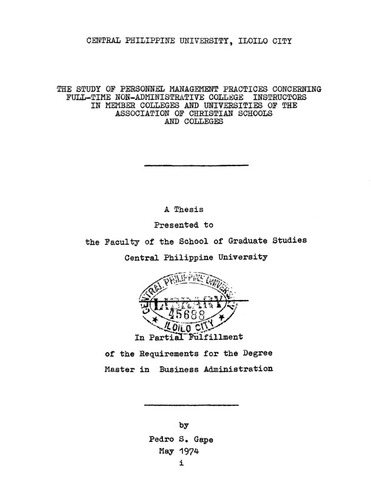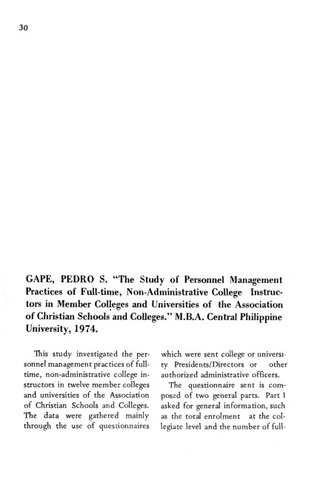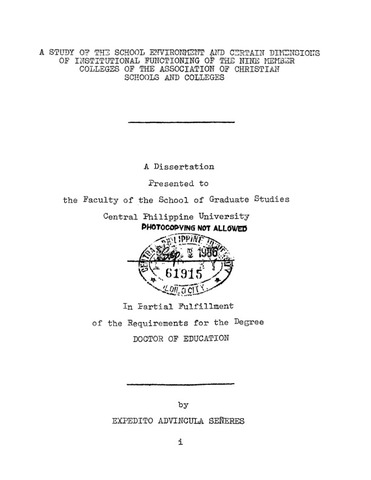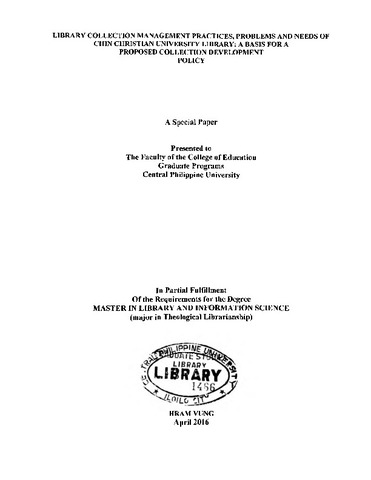Ipakita ang simpleng tala ng item
The study of personnel management practices concerning full-time non-administrative college instructors in member colleges and universities of the Association of Christian Schools and Colleges
| dc.contributor.adviser | Griño, Eliza U. | |
| dc.contributor.author | Gape, Pedro S. | |
| dc.date.accessioned | 2021-10-13T00:57:45Z | |
| dc.date.available | 2021-10-13T00:57:45Z | |
| dc.date.issued | 1974 | |
| dc.identifier.citation | Gape, P. S. (1974). The study of personnel management practices concerning full-time non-administrative college instructors in member colleges and universities of the Association of Christian Schools and Colleges (Unpublished Master’s thesis). Central Philippine University, Jaro, Iloilo City. | en_US |
| dc.identifier.uri | https://hdl.handle.net/20.500.12852/1542 | |
| dc.description | Introduction and statement of the problem | en_US |
| dc.description.abstract | Introduction It is generally assumed that the success or failure of any human pursuit depends on the type of personnel who perform the assigned tasks necessary to the accomplishment of the desired objective. This is true of school systems as it is of other organizations where the utilization of human effort is involved. The extent to which public or private education succeeds in its objective of offering and maintaining quality education will depend, to a large extent, upon the quality of personnel engaged in the educative process. This general assumption does not of course detract from the importance of other factors like having an impressive school plant, sufficient laboratory facilities, a well- stocked library, etc. These are important and necessary, too. However, the degree of their effectiveness rests on the people who direct and utilize them. Effective utilization of human resources calls for equally effective personnel management practices. Some of the more significant areas that may bear looking into are the following: 1. Recruitment, selection, and assignment of staff members, 2. Orientation or induction of staff members, 3. Employee development programs, 4. Employee retention and dismissal, 5. Salary administration, and 6. Employee benefits and services. Christian educational institutions in the Philippines are endeavoring to improve their personnel management practices just as they are so doing in other aspects of their administrative programs. Christian schools may be few compared with the total number of private educational institutions in the entire archipelago; however, they play a crucial role in achieving the nation’s educational objectives, out of proportion to their small number. For while they are to be held accountable mainly for the development of the physical and mental capabilities of the individual student, they perform an even more important task-the development of their spirituality. In addition. they have contributed to responsible leadership in the nation. No so-called Christian school, however, can be more Christian than the way it treats its personnel, neither can it be more efficient than the personnel it employs. It follows, therefore, that Christian schools must he expected to maintain effective personnel management practices. The Problem Statement of the problem. This study attempts to describe the personnel practices of the member colleges and universities of the Association of Christian Schools and Colleges concerning full-time, non-administrative college instructors. This research study attempts to answer these questions: 1. What are the practices of member colleges and universities in (a) the recruiting and selecting regular faculty members, (b) the inducting or orienting those selected, (c) developing faculty or giving them in- service training, (d) handling salary administration, (e) handling faculty turnover (as a facet of faculty retention and dismissal), and (f) providing faculty benefits and services? 2. Are these practices related to the size of the school? 3. Are the practices related to the location of the school? | en_US |
| dc.format.extent | 209 leaves | en_US |
| dc.language.iso | en | en_US |
| dc.subject.ddc | GSL Theses 378.242 G159 1974 | en_US |
| dc.subject.lcsh | Christian universities and colleges | en_US |
| dc.subject.lcsh | Christian universities and colleges--Management | en_US |
| dc.subject.lcsh | College teachers | en_US |
| dc.subject.lcsh | College teachers--Training of | en_US |
| dc.subject.lcsh | Employee fringe benefits | en_US |
| dc.subject.lcsh | Personnel management | en_US |
| dc.subject.lcsh | College personnel management | en_US |
| dc.subject.lcsh | Christian universities and colleges--Personnel management | en_US |
| dc.title | The study of personnel management practices concerning full-time non-administrative college instructors in member colleges and universities of the Association of Christian Schools and Colleges | en_US |
| dc.type | Thesis | en_US |
| dc.description.bibliographicalreferences | Includes bibliographical references | en_US |
| dc.contributor.chair | Herradura, Elma S. | |
| dc.contributor.committeemember | Ruiz, Macario B. | |
| dc.contributor.committeemember | Gumabong, Rodolfo P. | |
| dc.contributor.committeemember | Hofilera, Maggie A. | |
| dc.contributor.committeemember | Salas, Jessica C. | |
| dc.contributor.department | School of Graduate Studies | en_US |
| dc.description.degree | Master in Business Administration | en_US |
| local.subject | Association of Christian Schools, Colleges and Universities (ACSCU) | en_US |
| local.relation.associatedcontent | https://repository.cpu.edu.ph/handle/20.500.12852/2140 Journal article published in Southeast Asia Journal | en |





